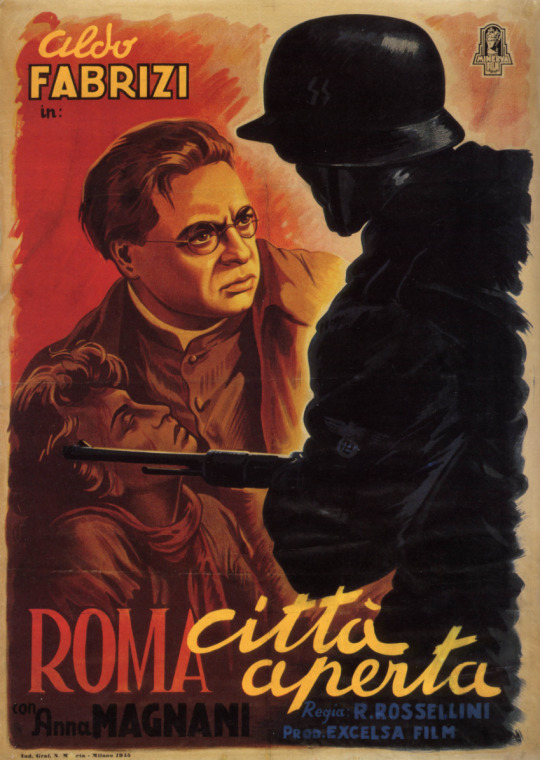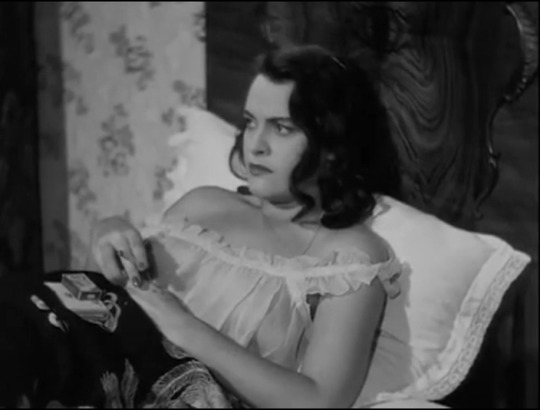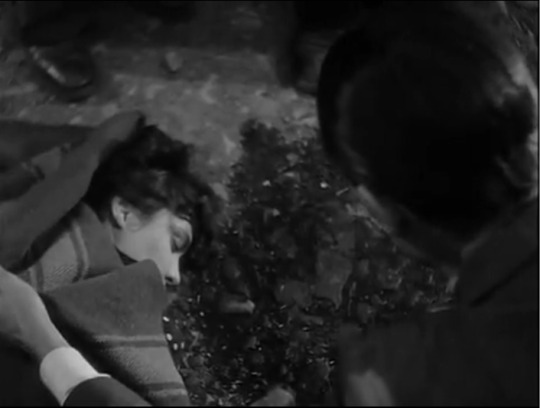#marcello pagliero
Explore tagged Tumblr posts
Text



Rome: Free City (Roma città libera) (1946) Marcello Pagliero
January 18th 2024
#rome: free city#Roma città libera#1946#Marcello Pagliero#valentina cortese#Andrea Checchi#Nando Bruno#Marisa Merlini#Vittorio De Sica#Gar Moore#Roma città libera (la notte porta consiglio)
3 notes
·
View notes
Photo

Roberto Rossellini’s “Roma città aperta” (Rome, Open City) September 27, 1945.
#Roberto Rossellini#Roma città aperta#Rome Open City#1945#Forties#Foreign#🇮🇹#World War II#WWII#Resistance#Drama#Aldo Fabrizi#Anna Magnani#Francesco Grandjacquet#Marcello Pagliero#4/5
11 notes
·
View notes
Text
9 dicembre … ricordiamo …
9 dicembre … ricordiamo … #semprevivineiricordi #nomidaricordare #personaggiimportanti #perfettamentechic
2022: Ruth Madoc, Margaret Ruth Llewellyn Baker, attrice britannica. (n.1943) 2021: Cara Williams, Bernice Kamiat, attrice statunitense. È stata sposata con John Drew Barrymore, padre di Drew Barrymore. (n.1925) 2021: Lina Wertmüller, Arcangela Felice Assunta Wertmüller von Elgg Spanol von Braueich, regista, sceneggiatrice e scrittrice italiana. Ha lungo sodalizio artistico con Enrico Job,…
#9 dicembre#Arcangela Felice Assunta Wertmüller von Elgg Spanol von Braueich#Bernice Kamiat#Cara Williams#Charles L. Gaskill#Charles Leslie Gaskill#Charlotte Smith#Eduardo Passarelli#Eleanor Jane Parker#Eleanor Parker#Fausto Sarli#Francesco Benenato#Franco Franchi#Gene Barry#Joseph Mascolo#Lando Fiorini#Leopoldo Fiorini#Lina Wertmuller#Lottie Pickford#Marcello Pagliero#Margaret Ruth Llewellyn Baker#Mary Ann Mobley#Morti 9 dicembre#Morti oggi#Ruth Madoc#Vincent Gardenia#Vincenzo Gardenia Scognamiglio#Vivian Blaine
0 notes
Text

#roma città aperta#rome open city#roberto rossellini#anna magnani#Marcello Pagliero#movie#film#movie gif
0 notes
Text
Rome, Open City (1945) Ending Explained & Spoilers: What Happens at the End?
Itself Roberto Rossellini It is impossible to approach the fourth feature film of the post-war period from a purely cinematic perspective. There are certainly many new shots, expressionistic lighting and narrative elements for the time, which can also be attributed to the film noir of the time. ROME, OPEN CITY but above all it is history itself. The film is set directly after the Allies’…

View On WordPress
#1945#Aldo Fabrizi#Anna Magnani#Films of the 1940s#Francesco Grandjaquet#Harry Feist#Marcello Pagliero#Roberto Rossellini
0 notes
Text
DESIDERIO - (Roberto Rossellini & Marcello Pagliero, 1943-1946)

"Tired of being a prostitute, Anna (Elli Parvo) decides to come back to her native village but her return is not what she imagined for herself: in the family she is welcomed with hostility and while her brother-in-law Nando (Massimo Girotti) goes nuts over her, the slimy Riccardo (Francesco Grandjacket) blackmails her by threatening to tell her past to her naive boyfriend (Carlo Ninchi) ".
Rossellini, influenced by "Ossessione" (Luchino Visconti, 1942), began the film (temporary title: "Scalo merci") in 1943 from a screenplay by Giuseppe De Santis, Rosario Leone and Diego Calcagno but the war events forced him to stop shooting and rewrite the plot (new title: "Rinuncia"); director Marcello Pagliero completed the movie (following Rossellini's suggestions) after the end of the war but the censorship intervened heavily. Nowadays a complete version is available that allows us to judge and criticize the movie as it deserves.
I can note all the elements of the great verist melodrama are evident in the film and there is much moralizing rethorics but some values are present and undeniable like the condemnation of the family and the explicit treatment of sex as a motive of human deviance (and Elli Parvo shows also her bare breast). Rossellini tries to represent the inner life of his characters and their inability to communicate by relating to themes of his future masterpieces, from "Germania anno zero" to the films with Ingrid Bergman.
r.m.



R.M.
0 notes
Text


Rome, Open City (1945)
#rome open city#roma città aperta#roberto rossellini#maria michi#marcello pagliero#movies#film#quotes#1945
244 notes
·
View notes
Photo

Putain Respectueuse, 1952
21 notes
·
View notes
Photo


desiderio (1946)
4 notes
·
View notes
Photo

Movie #64 of 2020: Paisan
“If you fall asleep, I’ll steal your shoes.”
#paisan#roberto rossellini#italian#english#drama#war#sergio amidei#federico fellini#klaus mann#marcello pagliero#alfred hayes#rod e. geiger#vasco pratolini#renzo rossellini#otello martelli#eraldo da roma#german#sicilian#35mm#1946#64#great
7 notes
·
View notes
Text







Rome, Open City (Roma città aperta) (1945) Roberto Rossellini
June 22nd 2024
#rome open city#Roma città aperta#1945#roberto rossellini#aldo fabrizi#anna magnani#Marcello Pagliero#Maria Michi#Francesco Grandjacquet#Harry Feist#Giovanna Galletti#Nando Bruno#Ákos Tolnay#Carla Rovere#federico fellini#mubi
5 notes
·
View notes
Photo

2 notes
·
View notes
Text
9 dicembre … ricordiamo …
9 dicembre … ricordiamo … #semprevivineiricordi #nomidaricordare #personaggiimportanti #perfettamentechic
2022: Ruth Madoc, Margaret Ruth Llewellyn Baker, attrice britannica. Ottenne il successo negli anni ottanta, interpretando la protagonista Gladys Pugh nella serie televisiva Hi-de-Hi!. Molto attiva anche in campo teatrale. Fu sposata con Philip Madoc dal 1961 al divorzio nel 1981 e la coppia ebbe due figli; successivamente si risposò con John Jackson nel 1982 e la coppia rimase insieme fino alla…

View On WordPress
#9 dicembre#Arcangela Felice Assunta Wertmüller von Elgg Spanol von Braueich#Bernice Kamiat#Cara Williams#Charles L. Gaskill#Charles Leslie Gaskill#Charlotte Smith#Eduardo Passarelli#Eleanor Jane Parker#Eleanor Parker#Fausto Sarli#Francesco Benenato#Franco Franchi#Gene Barry#Joseph Mascolo#Lando Fiorini#Leopoldo Fiorini#Lina Wertmuller#Lottie Pickford#Marcello Pagliero#Margaret Ruth Llewellyn Baker#Mary Ann Mobley#Morti 9 dicembre#Morti oggi#Ruth Madoc#Vincent Gardenia#Vincenzo Gardenia Scognamiglio#Vivian Blaine
0 notes
Photo

8 notes
·
View notes
Photo

Rome, ville ouverte / Un curé et un résistant sifflent ensemble un air connu.
#Cinéma#Rome ville ouverte#Roma città aperta#Roberto Rossellini#Aldo Fabrizi#Anna Magnani#Marcello Pagliero#Vito Annichiarico#Nando Bruno#Harry Feist#Giovanna Galletti#Francesco Grandjacquet#Maria Michi
1 note
·
View note
Photo










Roma città aperta (1945)
#roma città aperta#rome ville ouverte#rome open city#roberto rossellini#aldo fabrizi#anna magnani#giovanna galletti#marcello pagliero
34 notes
·
View notes